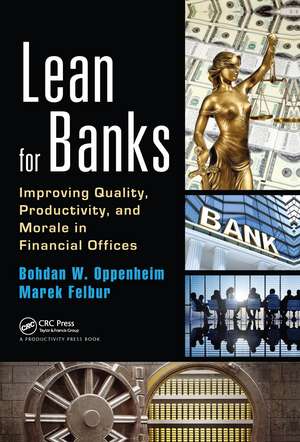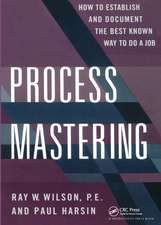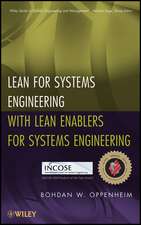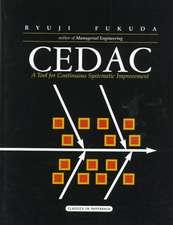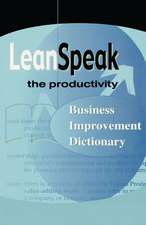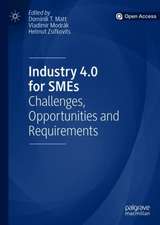Lean for Banks: Improving Quality, Productivity, and Morale in Financial Offices
Autor Bohdan W. Oppenheim, Marek Felburen Limba Engleză Hardback – 18 dec 2020
| Toate formatele și edițiile | Preț | Express |
|---|---|---|
| Paperback (1) | 242.06 lei 6-8 săpt. | |
| Taylor & Francis – 21 noi 2014 | 242.06 lei 6-8 săpt. | |
| Hardback (1) | 990.09 lei 6-8 săpt. | |
| Taylor & Francis – 18 dec 2020 | 990.09 lei 6-8 săpt. |
Preț: 990.09 lei
Preț vechi: 1330.72 lei
-26% Nou
Puncte Express: 1485
Preț estimativ în valută:
189.45€ • 197.80$ • 156.80£
189.45€ • 197.80$ • 156.80£
Carte tipărită la comandă
Livrare economică 05-19 aprilie
Preluare comenzi: 021 569.72.76
Specificații
ISBN-13: 9781138463929
ISBN-10: 1138463922
Pagini: 240
Dimensiuni: 178 x 254 mm
Greutate: 0.63 kg
Ediția:1
Editura: Taylor & Francis
Colecția Productivity Press
Locul publicării:Oxford, United Kingdom
ISBN-10: 1138463922
Pagini: 240
Dimensiuni: 178 x 254 mm
Greutate: 0.63 kg
Ediția:1
Editura: Taylor & Francis
Colecția Productivity Press
Locul publicării:Oxford, United Kingdom
Public țintă
Professional Practice & DevelopmentRecenzii
"Lean for Banks is extremely thorough and authoritative in its summary of what Lean is and why it matters today. Moreover, it draws from convincing material to apply Lean to the banking industry. On top of that, the writers have some fun with the material."
— John Shook, CEO, Lean Enterprise Institute, Cambridge, MA.
"Lean for Banks is an operating model we all dream of in this period of regulatory tsunami. This book is a great help in implementing a high quality approach toward the permanent improvement of bank procedures and processes. It is a must for the traditional ‘heavy’ banking sector in order to survive growing competition. Blind cost cutting has only limited impact on a bank's performance in the long run. Lean can increase long-term competitiveness. I recommend this book to all managers restructuring banks as a source of Lean tools and methodology."
— Dr. hab. Krzysztof Kalicki, President and CEO, Deutsche Bank Polska S.A.
"During the crisis many banks were forced to restructure their operations in order to improve efficiency and reduce costs at the same time. Cost cutting gives quick results but does not always solve the problem of quality and performance in the longer perspective. This book shows how Lean Thinking and the Six Sigma paradigm can help to smartly improve bank operations and create additional value for the organization, employees and shareholders."
— Li Xiaobo, General Manager of Industrial and Commercial Bank of China (ICBC), Europe, S.A.
— John Shook, CEO, Lean Enterprise Institute, Cambridge, MA.
"Lean for Banks is an operating model we all dream of in this period of regulatory tsunami. This book is a great help in implementing a high quality approach toward the permanent improvement of bank procedures and processes. It is a must for the traditional ‘heavy’ banking sector in order to survive growing competition. Blind cost cutting has only limited impact on a bank's performance in the long run. Lean can increase long-term competitiveness. I recommend this book to all managers restructuring banks as a source of Lean tools and methodology."
— Dr. hab. Krzysztof Kalicki, President and CEO, Deutsche Bank Polska S.A.
"During the crisis many banks were forced to restructure their operations in order to improve efficiency and reduce costs at the same time. Cost cutting gives quick results but does not always solve the problem of quality and performance in the longer perspective. This book shows how Lean Thinking and the Six Sigma paradigm can help to smartly improve bank operations and create additional value for the organization, employees and shareholders."
— Li Xiaobo, General Manager of Industrial and Commercial Bank of China (ICBC), Europe, S.A.
Cuprins
Introduction. Ideal versus Traditional Bank. The Amazing History of Lean. Critical Lean Concepts: Value, Eight Wastes, and Six Lean Principles. Tools of Lean. Deploying Lean. Lean Enablers for Banks. Lean Product Development Flow (LPDF).
Notă biografică
Bohdan W. Oppenheim, PhD has been a professor of systems engineering at Loyola Marymount University in Los Angeles since 1983. He is a recognized global leader in Lean systems engineering and author of an influential book titled Lean for Systems Engineering with Lean Enablers for Systems Engineering. Dr. Oppenheim co-led a team of 15 experts supported by a community of 150 practitioners to develop the best Lean-inspired practices for managing complex engineering programs. For this work he received the Shingo Award, the highest honor in the field of operational excellence, INCOSE‘s Best Product Award, and two smaller awards. This work was later expanded into a joint project of the Project Management Institute (PMI), International Council on Systems Engineering (INCOSE) led by a team based at Massachusetts Institute of Technology on which Oppenheim served as key contributor. The result was a second book on Lean-inspired best practices for managing engineering programs, The Guide to Lean Enablers for Managing Engineering Programs for which the team was honored with a Shingo Award (the second for Oppenheim). Dr. Oppenheim is the founder and co-leader of the INCOSE Lean Systems Engineering Working Group, the organization‘s largest working group involving more than 200 members. He also directed Loyola Marymount University‘s US Department of Energy Industrial Assessment Center. In this capacity, he advised 125 Southern California companies of all sizes and types on Lean productivity matters. With S. Rubin, Dr. Oppenheim designed Aerospace Corporation‘s POGO simulator for liquid rockets used by NASA and private industry. He consulted for Northrop-Grumman, Boeing, Airbus, EADS, Telekomunikacja Polska, Mars, Medtronics, the US Coast Guard and the US Air Force, Thales, TRW, and 50 other firms and governmental institutions in the United States and Europe. Dr. Oppenheim is or was a member of INCOSE, LAI EdNet,
Descriere
Lean for Banks describes in easy language how to use Lean and Six Sigma management practices to significantly improve the efficiency of bank operations.
